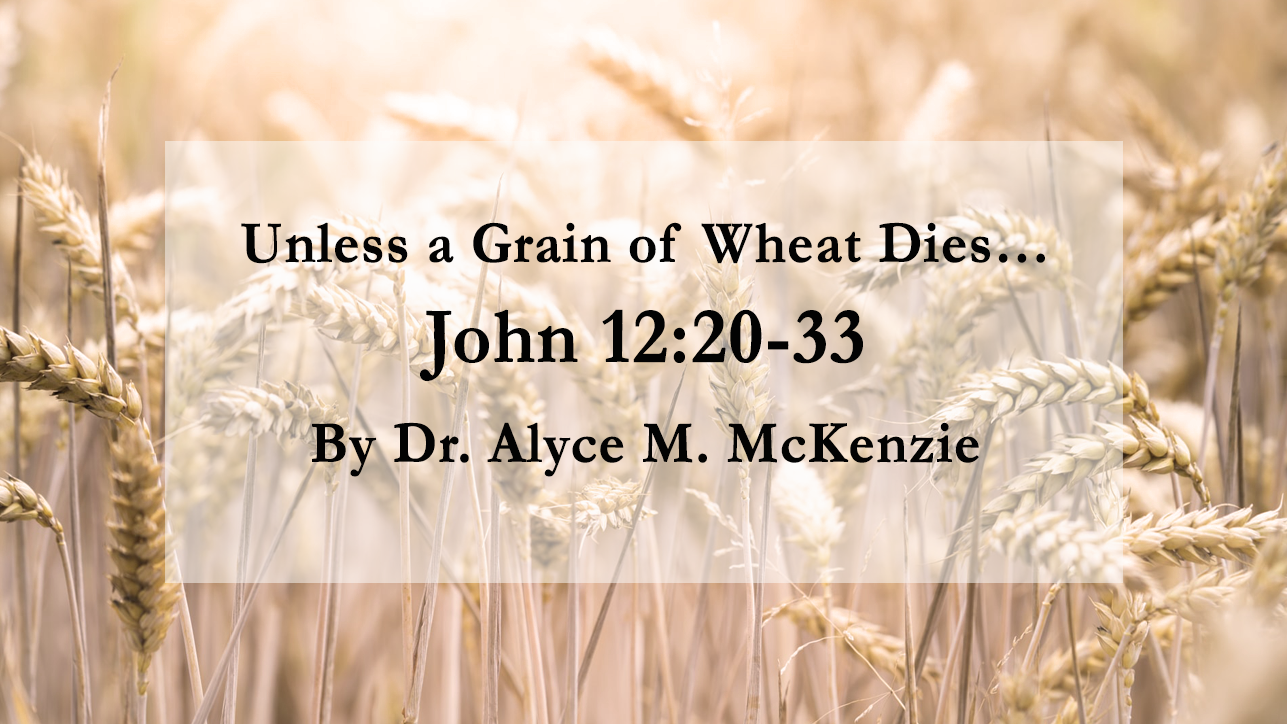Unless a Grain of Wheat Dies - Reflections on John 12:20-33
by Alyce M. McKenzie on Monday, March 15, 2021

Lent V John 12:20-33 March 21, 2021
Unless a Grain of Wheat Dies…
Jesus Reflects on his Imminent Dying and Being “Lifted Up”
This passage begins with the words of a group of Gentile worshippers visiting Jerusalem for Passover.
They come to Philip and make their request:
“Sir, we wish to see Jesus.” (John 12:21) What are their tone and posture? Plaintive? Demanding? What is their motivation? Curiosity? Reverence? We aren’t told.
We wish to see Jesus, too, on this fifth Sunday in Lent 2021.
His response is the same to us as it was to them. He says his hour has arrived and offers a Johannine version of the paradoxical saying about saving and losing (“Unless a grain of wheat falls into the earth and dies….” John 12:25) we have seen in all three synoptic gospels. (Mark 8:35; Matthew 16:25; Luke 17:33)
The gospel text for Lent II included Mark’s: “For those who want to save their life will lose it, and those who lose their life for my sake and for the sake of the gospel, will save it.” (Mark 8:35)
This is not a mandate to become a martyr or a doormat, but to recognize that following Jesus requires that we give up our self-focused agendas and/or that we sacrifice allowing ourselves to be subjected to others’ oppressive agendas, to step into our identity as children of God and an experience of abundant life.
This aphorism, which I’ve labeled “Finders weepers, losers keepers,” contains, in a nutshell, the whole narrative arc of Jesus’ life, death, resurrection, and ongoing life through us. It was, if you will, his motto for living. And for dying and rising.
In John 12:24, Jesus, says, with reference to himself, “Unless a grain of wheat falls into the earth and dies, it remains just a single grain; but if it dies, it bears much fruit.” (John 12:24)
In the following verse, Jesus says, with reference to our lives as his disciples: “Those who love their life will lose it, and those who hate their life in this world will keep it for eternal life.” (John 12:25)
New Testament scholar Andrew Lincoln makes this incisive comment about this verse:
“To hate one’s life does not mean to despise one’s life as having no value. It is to have a higher, more encompassing allegiance than that to one’s own survival.” (Lincoln, 350)
When we follow this path of allegiance to Jesus, we move from walking in darkness to living in the light. We entrust ourselves to the revelation of God in Jesus Christ and become children of light. (John 12: 35-36)
In this passage, the validity of this teaching of Jesus is underscored by a voice from heaven confirming the imminence of Jesus' death and resurrection as the Son of man is lifted up. John 12:32). This is the third reference to his being lifted up in John’s gospel (John 3:14; 8:28), expressing echoes of Isaiah’s suffering servant who is to be lifted up and glorified. (Is 52:13)
A valuable sermonic approach would be to invite listeners to make belief in (trust in) Jesus as the Revelation of God their highest allegiance in life, reflect on the sacrifices that entails, and offer a vision of its benefits and fruits. It will be important to make clear that sacrifice does not mean subjection to abuse or the embrace of suffering as inherently good.
Sources Consulted
Andrew T. Lincoln, Black’s New Testament Commentary The Gospel According to John (Hendrickson Publishers, 2005).
